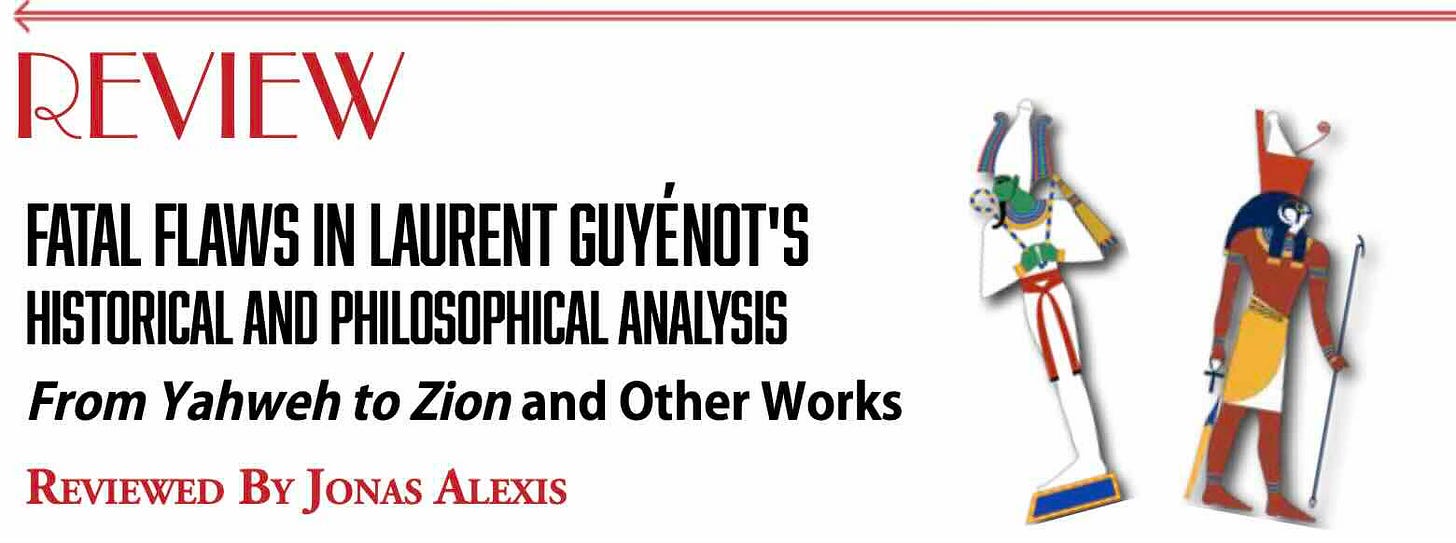Here is a follow-up to my latest interview with Laurent Guyénot. If you find value in my work, which has been demonetized here at Substack, please make a (preferably recurring) donation via Paypal—or better yet the free-speech platform SPdonate.
Jonas Alexis sent me his recent Culture Wars article “FATAL FLAWS IN LAURENT GUYENOT'S HISTORICAL AND PHILOSOPHICAL ANALYSIS: From Yahweh to Zion and Other Works.” It’s actually more of a comprehensive wide-ranging article on the Jewish Question, rooted in a Catholic perspective, than a review of Guyénot.
Alexis writes: “I was also quite shocked that my esteemed colleague, Kevin Barrett, who translated the book into English and edited it (sic), did not point out some of these categorical errors to Guyénot.”* The two main “categorical errors” Alexis finds are: (1) Guyénot briefly discusses parallels between Christ and Osiris; and (2) Guyénot finds it exceedingly unlikely that the “Jewish problem” will be solved by the mass conversion of Jews to Christianity.
I responded that I agreed that the Jesus-Osiris comparison is debatable, but that it’s a very minor aspect of Guyénot’s overall argument, which concerns how Zionism and other problematic aspects of Jewish Power are rooted in the Torah a.k.a. the Old Testament. I also agreed with Jonas that individual Jews have converted to Christianity, some even sincerely, but agree with Guyénot that the mass conversion of the whole tribe seems unlikely.
Below is a selection from our continuing email dialogue on the issue.
Jonas Alexis wrote:
If the Osiris issue and the claim that “Jews won’t convert” are merely tangential, will Laurent revise the book in the next edition and leave those sections out? Or will he continue to include them, leaving readers with the impression that these issues have never been addressed? That’s the only way I would be convinced that they are not truly part of the book’s core argument.
Again, I don’t think it’s that important. How many of the nearly 500 pages does he devote to Osiris?
Moreover, I have provided historical evidence that Jews have converted throughout history. One cannot simply dismiss this by arguing that only “individual Jews” have converted. The real issue is that it is historically inaccurate to claim that “it is mainly Jews who have been converting Christians to Yahwism/Satanism/materialism, etc., for the last 500 years and not the other way around.”** The fact is that the Jewish elite—who have always represented a small minority—have consistently dominated the lives of average Jews. This is why they have gained power “for the last 500 years.”
Laurent’s point, with which I concur, is that it’s plainly obvious that the existence of Christianity and ongoing efforts to convert the Jews have not solved the Jewish problem, nor even made the slightest dent in it, and that with the decline of Christianity this potential solution has become even more untenable now than it was in the past.
I seriously believe that Laurent does not understand the difference between the Old Testament and the Talmud. Jews do not live by the Old Testament; they live by the Talmud, which provides their own interpretation of how the Old Testament should be understood (Has Laurent even read Michael Hoffman's Judaism Discovered?). In fact, Christ himself declared that if the Jews truly believed in the Old Testament, they would have believed in him. This implies that they would not have engaged in Satanic activities since the first century. Historians and Hebrew scholars have explored this issue extensively, and if Laurent would like me to address it further, I am willing to do so this summer.
OT/Torah is basically the same book. What’s different are the interpretations. As a literature teacher, I used to grade textual interpretations, which vary in validity based on how well the interpreter understands the message(s) the author was trying to convey. To me it’s obvious that the authors of OT/Torah were Jewish tribalists, and that their portrayal of Yahweh is both absurd in many respects (beginning with anthropomorphism) and radically different from that of the NT, Qur’an, and other great universal-spiritual religious and theosophical traditions. Christians who interpret the OT as a Christian book “do violence to the text” in the same way that an overly imaginative undergraduate literature student sometimes projects his own ideas on a text that is plainly expressing very different ideas.
To claim that “an objective, unbiased reader will read the Torah as tribal mythology, not as a lead-up to Jesus”** is akin to saying that all passages in the Quran about killing infidels should be read in isolation, without considering historical and contextual factors.
Wrong! No neutral, fairminded, objective, unbiased etc. reader seeking the best interpretation would ever argue that the Qur’an advocates a general policy of “killing infidels.” That is a preposterously bad, grotesquely tendentious misinterpretation that does violence to the text/context. In the same way, reading the OT/Torah, or at least a great many passages, as compatible with the universalist messages of Jesus, Mohammad, Buddha, Lao-Tzu, Socrates, or even elementary ethics requires doing similar violence to the text/context.
No Christian interprets the Old Testament in such a way. Furthermore, Christ frequently cited the Old Testament. If Christ cannot lie—as even the Quran acknowledges—why would he cite it in a positive light? Christ affirms both the Old Testament and Yahweh, whom Laurent describes as “psychopathic.” The criticisms would disappear if we apply the same standard to Islam or other worldviews.
First, there is no good reason to believe the NT has been well-preserved, and (for Muslims and secular historians) compelling reasons to assert that it has not been. So we shouldn’t take every NT word attributed to Jesus as Gospel. If a source tells me Jesus called what we now know as the Torah/OT inerrant scripture, I am inclined to reject that source. But since I take a more nuanced view of OT/Torah than Laurent does, I’ll admit the possibility that Jesus found value in some of it—and I wholeheartedly affirm that Jesus reaffirmed the Divine message that came to messengers mentioned in the Torah/OT. But that message was distorted by the transmitters, producing the radically flawed book we have today.
If time permits, I plan to write a second review of the book this summer. I remain shocked that Laurent would venture to write about these topics while ignoring a vast body of scholarly literature. To start, I would highly recommend the following materials to both you and Laurent:
Is God a Moral Monster?: Making Sense of the Old Testament God by Paul Copan
Did God Really Command Genocide?: Coming to Terms with the Justice of God by Paul Copan and Matt Flannagan
God’s Righteousness and Justice in the Old Testament by Jože Krašovec
Thank you for these recommendations. I read the OT cover-to-cover in 2008 (skimming begets and begots, etc.) and appreciate being guided to the best Christian apologetics on the topic.
Best
Kevin
*In reality, I did not edit the book, but only translated it.
** Jonas is quoting me from an earlier email.




Relative to Jonas Alexas, We are always communicating our state whether we like it or not. Jonas' beliefs are getting in his way. Beliefs are useless baggage. The Root of the Nazorean Gospel is Perfectly Obvious as Prior Reality. LAURENT GUYENOT is worthy of his friendship and brotherhood.
There are a couple of books I would heartily recommended to anyone who is discoursing on Christianity and its meaning:
"The Quest of the Historical Jesus" by Dr. Albert Schweitzer
"The Wisdom of St. John" by Bô Yin Râ (Joseph Anton Schneiderfranken)